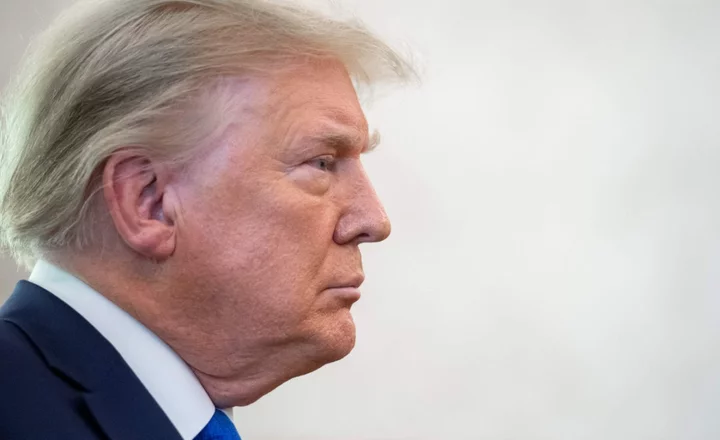Trump-appointed judge will initially preside over ex-president’s federal indictment
The federal judge who will initially preside over Donald Trump’s criminal indictment in the classified documents case was appointed by the former president and delivered him a series of controversial and favourable rulings during the investigation. US District Judge Aileen Cannon, who was appointed to the bench in 2020 during Mr Trump’s final year in office, is scheduled to preside his federal court case in Miami when he faces seven counts in an indictment involving his alleged mishandling of sensitive records removed from the White House and kept at his Mar-a-Lago property. ABC News first reported the development. Last year, Judge Cannon appointed a “special master” to review materials seized by federal law enforcement and restricted the FBI from using those documents as part of the investigation until she completed a review, effectively freezing the US Department of Justice probe. That order was ultimately thrown out entirely by a federal appeals court. The three-judge panel sharply criticised Judge Cannon’s order, writing that it is “extraordinary for a warrant to be executed at the home of a former president – but not in a way that affects our legal analysis or otherwise gives the judiciary license to interfere in an ongoing investigation.” “The law is clear,” the panel wrote. “We cannot write a rule that allows any subject of a search warrant to block government investigations after the execution of the warrant. Nor can we write a rule that allows only former presidents to do so.” Magistrate Judge Bruce Reinhart, who signed a warrant for federal authorities to search Mar-a-Lago in August 2021, will preside over Mr Trump’s first court appearance in Miami on 13 June. With a relatively brief career before her federal appointment, Judge Cannon, among a crowd of Federal Society acolytes that have reshaped the federal judiciary, was confirmed by the US Senate by a vote of 56-21. She previously served as an assistant US attorney for the Justice Department in the Southern District of Florida. If she does not recuse herself from the case and she remains a trial judge, she could play a potentially critical role in the case’s development, including whether to set a trial before or after presidential primary elections and the general election in 2024. She also could determine whether to admit certain evidence, decide on motions or dismiss arguments entirely. She also would preside over sentencing, if there is a conviction. Her decisions also would be subject to the review of a federal appellate court. Read More Trump indictment — live: Trump’s brazen classified document admission revealed amid MAGA meltdown over charges Obstruction, witness tampering, conspiracy: The federal charges against Donald Trump How Trump’s second indictment unfolded: A timeline of the investigation into Mar-a-Lago documents
The federal judge who will initially preside over Donald Trump’s criminal indictment in the classified documents case was appointed by the former president and delivered him a series of controversial and favourable rulings during the investigation.
US District Judge Aileen Cannon, who was appointed to the bench in 2020 during Mr Trump’s final year in office, is scheduled to preside his federal court case in Miami when he faces seven counts in an indictment involving his alleged mishandling of sensitive records removed from the White House and kept at his Mar-a-Lago property. ABC News first reported the development.
Last year, Judge Cannon appointed a “special master” to review materials seized by federal law enforcement and restricted the FBI from using those documents as part of the investigation until she completed a review, effectively freezing the US Department of Justice probe.
That order was ultimately thrown out entirely by a federal appeals court.
The three-judge panel sharply criticised Judge Cannon’s order, writing that it is “extraordinary for a warrant to be executed at the home of a former president – but not in a way that affects our legal analysis or otherwise gives the judiciary license to interfere in an ongoing investigation.”
“The law is clear,” the panel wrote. “We cannot write a rule that allows any subject of a search warrant to block government investigations after the execution of the warrant. Nor can we write a rule that allows only former presidents to do so.”
Magistrate Judge Bruce Reinhart, who signed a warrant for federal authorities to search Mar-a-Lago in August 2021, will preside over Mr Trump’s first court appearance in Miami on 13 June.
With a relatively brief career before her federal appointment, Judge Cannon, among a crowd of Federal Society acolytes that have reshaped the federal judiciary, was confirmed by the US Senate by a vote of 56-21.
She previously served as an assistant US attorney for the Justice Department in the Southern District of Florida.
If she does not recuse herself from the case and she remains a trial judge, she could play a potentially critical role in the case’s development, including whether to set a trial before or after presidential primary elections and the general election in 2024.
She also could determine whether to admit certain evidence, decide on motions or dismiss arguments entirely. She also would preside over sentencing, if there is a conviction. Her decisions also would be subject to the review of a federal appellate court.
Read More
Trump indictment — live: Trump’s brazen classified document admission revealed amid MAGA meltdown over charges
Obstruction, witness tampering, conspiracy: The federal charges against Donald Trump
How Trump’s second indictment unfolded: A timeline of the investigation into Mar-a-Lago documents

